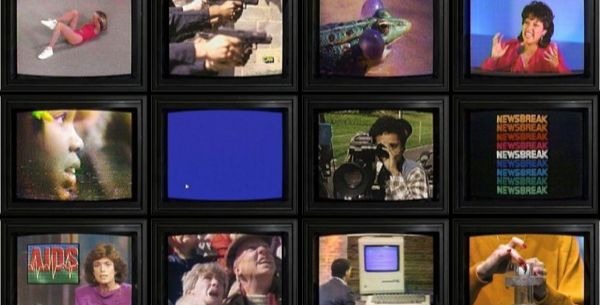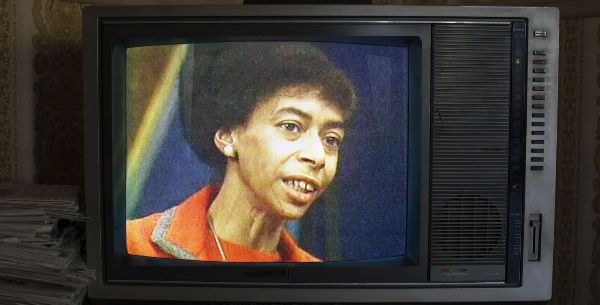RECORDER: THE MARION STOKES PROJECT & The Transience Of Public Memory

Tynan loves nagging all his friends to watch classic movies…
In an era where mass media is so pervasive and rampant in its many forms, and at the very same time so ephemeral; the story of Marion Stokes could not be a more timely caveat to public discourse. Director Matt Wolf‘s examination of the woman is twofold, tackling both her life’s work and her rather enigmatic and even reclusive private life. Because Mrs. Stokes’s private endeavor was public service verging on the apex of obsession.
The task she put before herself was to record television as a public record for future generations. She began the undertaking inauspiciously in 1976 and kept tapes running continuously on multiple TVs for over 30 years! The project finally ceased with her death in 2012 with over 70,000 tapes!
She’s this paradoxical creature of craziness and brilliance driven by an unerring activism to seek out the truth and provide access to knowledge for all people. Her convictions call to mind an often circulated quote. Whether or not it’s apocryphal — I’ve heard it attributed to everyone from Edmund Burke to George Santayana — the saying goes, those who are ignorant of history are doom to repeat it.
Regardless, of whether or not Stokes imbibed these particular words, there’s little doubt her private preservation efforts provided a remarkable vessel to help fuel public memory. Wolf’s exploration calls on the voices of family members, caretakers, and Television historians to try and glean an understanding of this complex woman and her cultural impact. Of course, more than any of this — although slightly undermined by the distracting counter scoring — the images gain primacy as a testament to all her work. In this case, the picture is worth a thousand words and there are a lot of them!
A Personal Mission
Like many, I’ve grown up as part of a television generation, but I’ve also gained a preoccupation with television history. I remember an early trip to the Museum of Television and Radio in New York City to glean my first glimpses of Leave it to Beaver, Crusader Rabbit, and What’s my Line? It was like happening upon an untapped holy grail.
Because those were before the days the interwebs and Youtube helped to, in some ways, democratize and at least disseminate some of this entertainment (both legally and illegally). Likewise, the Television Academy Interviews through The Academy of Television Arts & Sciences Foundation has been a rich source to learn firsthand about television’s roots.

Marion Stokes was on the ground floor of these efforts providing a television archive unto itself. What she gave us is so valuable in its own right as a primary source full of cultural moments as they happened. Her son admits she was an avid Trekkie because, for various reasons, it equated to a kind of idealistic televised socialism of the future. She also voraciously took in sitcoms, documentaries, and, of course, current events.
We get an eye into the Iranian Hostage Crisis of 1979, then the birth of Dateline and CNN’s 24-hour news cycle. It illustrates TV’s evolving power to inform and, at times, misinform, thereby shaping public opinion. For Stokes, the mediation of media was so vital along with stewarding the knowledge it provides — hence her massive undertaking. Because in a sense, media reflects society back to itself. This is no more evident when we look back in hindsight.
Part of what becomes fascinating is how this rectangular box in front of us can bring together so many disparate elements together into the privacy of our living rooms. Doctor Who, The Reagan assassination attempt, and Julia Child all convene. As history continues to march on, there are moments like the devasting Challenger explosion, the Clinton impeachment proceedings, and something as mundane as the New Year’s Eve Ball Drop.
Staying true to her lifelong themes, Marion was an early proponent of Mac computers because, of course, she saw technology as a way to unlock laypeople’s potential. It was an avenue toward enhanced human freedom and creativity. In her own way, she identified greatly with Steve Jobs — his humble origins, the shrewdness of his character, and, probably his tendency to be incredibly demanding of others.
With the vast amounts of content Marion Stokes collected, it would also make sense that broad trends were possible to pinpoint. One that’s not altogether surprising is police brutality — this pervasive web of violence. In Stokes’s own words, the master narrative is often written by the victors from their own bias.
Likewise, the information she gathered was so extensive, it was possible to observe near-real-time minutiae. One day I’ll never forget was 9/11, but even now it’s more like an impression than an actual minute by minute account in my head. This doc provides a fairly substantial Network-like survey of all the simultaneous broadcasts showing how the story slowly unfolded amid the day’s normal diversions. It was a day like any other day until it wasn’t.
A Private Life
Marion Stokes’s insistence on preserving knowledge for the people finds deep roots in her early passion for social action in the pursuit of human freedom. However, being a Communist as she was, in such a tumultuous era, came with many repercussions. Fearing America would replicate the travesties of Nazi Germany, she urged her first husband to defect to Cuba with her. They abandoned the idea, but with a young son and her demanding nature, their marriage was already on the skids; Marion probably didn’t know she was also on file with the FBI.

However, she continued to exercise her passion for developing an open forum of communication by joining her local television network’s debate program Wellspring where the panelists tackled major social issues. There she met an idealistic kindred spirit of sorts in John S. Stokes Jr. He would quickly become the most important companion in her life, and they spent years devoted to one another living in relative isolation.
In the ensuing decades, the affluent couple kept to themselves and in tandem, Marion continued her pack ratting ways with archives full of not only thousands of videocassettes but spilling over into magazine and book stockpiles totaling over 40 or 50,000 on their own!
Conclusion: The Marion Stokes Project
These revelations play a bit like the final dizzying denouement to Raiders of The Lost Ark. The Marion Stokes Project captures both the inherent humor and the utter absurdity of what this single-minded woman devoted her life to. However, buried within all those hours of footage are gems and relics to capture a time and place in an unprecedented fashion. In her own way, she was a kind of visionary with a unique ability to recognize both shifts in media and technology. Really, she was ahead of the curve.
If the cost isn’t already evident, maintaining comprehensive information about the state of the world came at the cost of getting real, up-to-date information about the state of her family. If there is a bit of a bright spot, it’s the fact Marion cultivated a bit of a surrogate family made up of her devoted staff including caretakers and a chauffeur. Also, later in life, she mellowed some reconciling with her son and building generational connections with her grandkids.
In a world that’s so very transient and disposable, this is a fitting reminder of how impactful legacy can be. It’s nice to know Marion Stokes’s legacy stretched a bit beyond the robust television witness she left behind. At least to a small extent, it involved human relationships too. Because what is television if not a record with which to document humanity — all our various triumphs and failures? Marion Stokes might help us remember the breadth of our humanity lest we forget any of it.
Do you think Marion Stokes was a visionary, an eccentric, or a little bit of both? Please let us know your thoughts in the comments below!
Recorder: The Marion Stokes Project was originally released in the U.S. on November 15th, 2019.
Does content like this matter to you?
Become a Member and support film journalism. Unlock access to all of Film Inquiry`s great articles. Join a community of like-minded readers who are passionate about cinema - get access to our private members Network, give back to independent filmmakers, and more.
Tynan loves nagging all his friends to watch classic movies with him. Follow his frequent musings at Film Inquiry and on his blog 4 Star Films. Soli Deo Gloria.













